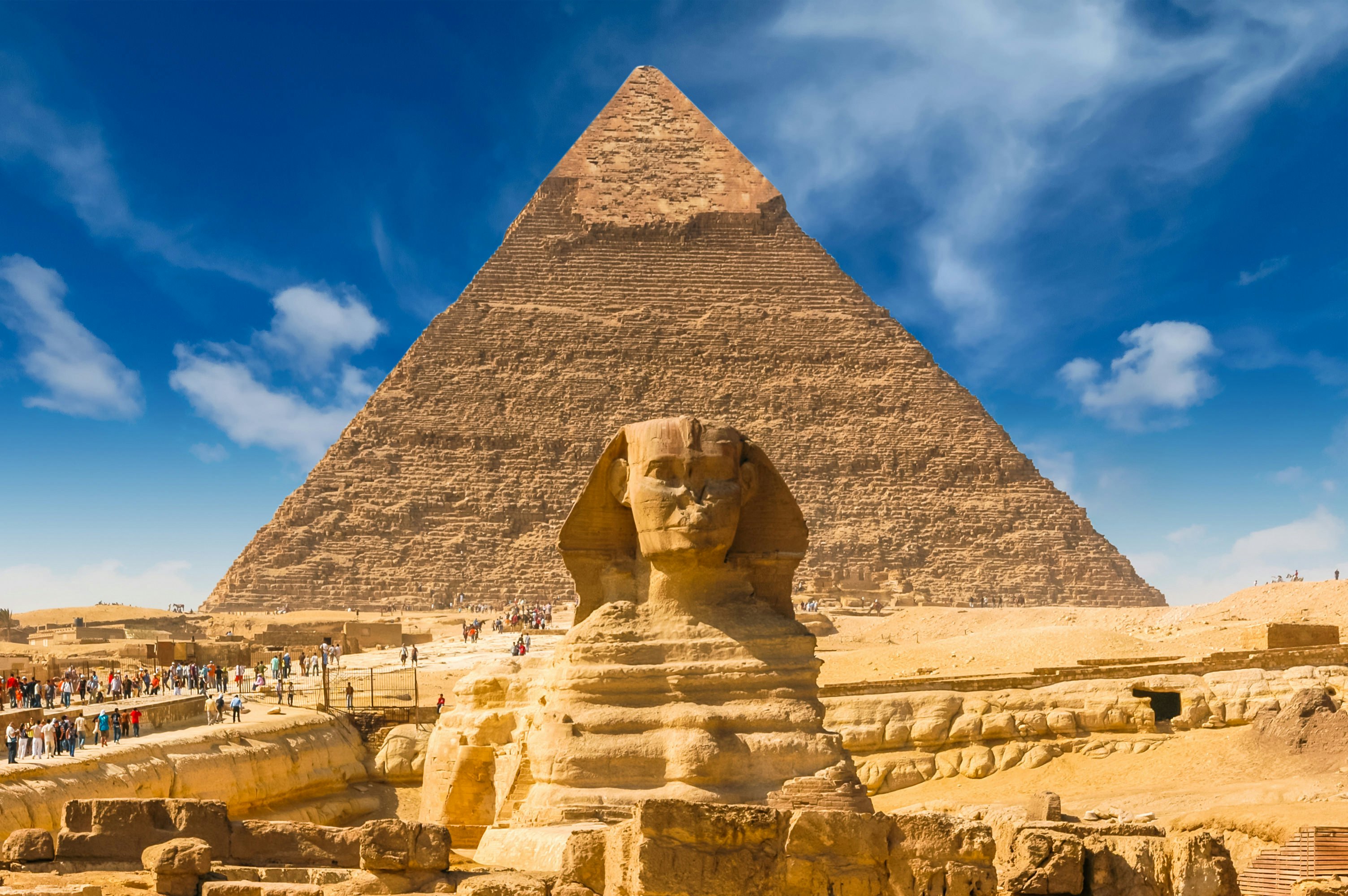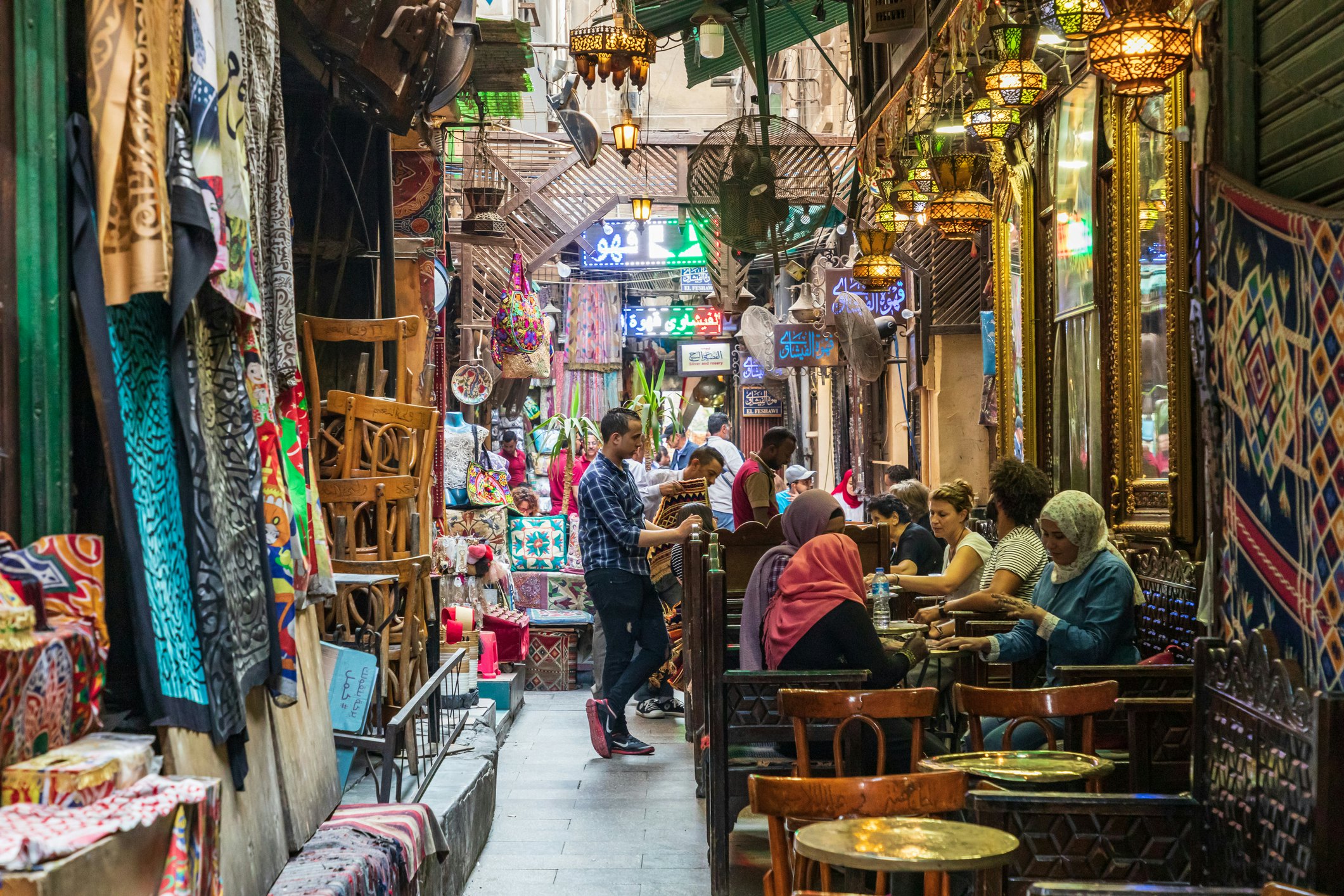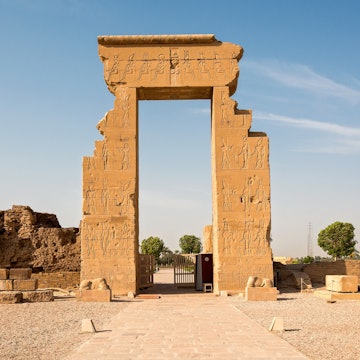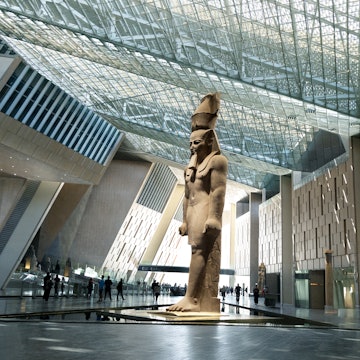

Find out how to travel on a budget in one of the world's most coveted destinations: Cairo © Mystockimages / Getty Images
Cairo is one of the biggest budget-friendly cities on the planet – where else can US$11 buy you entry to a wonder of the world? The capital of Egypt – and the country as a whole – is a great destination for travelers on a budget, with reasonable prices for accommodation (even high-end properties if you time it right), food and activities.
However, be mindful that Egypt’s economy is floundering. Inflation has soared – the Egyptian pound is worth half of what it was in 2022 – and the currency fell to an all-time low against the US dollar in January 2023. While favorable exchange rates are good news for foreign visitors, poverty is becoming more widespread, and basics like eggs and meat are becoming luxury items even for middle-class Egyptian families.
Tourism makes up a significant percentage of Egypt’s GDP, so pay fairly for services and haggle respectfully. Here’s how to visit Cairo on a budget.
Daily costs
Bed in a hostel dorm: LE247 (US$8)
Basic hotel room for two: LE927 (US$30)
Independent boutique hotel: LE2165-3710 (US$70-120)
Cairo Metro ticket: LE5-10 (US$0.15-0.30)
Cup of Turkish coffee: LE26 (US$0.85)
Falafel sandwich: LE20 (US$0.65)
Sit-down dinner for two: LE310 (US$10)
Museum or archaeological site entry: LE95-465 (US$3-15)
Average daily cost
Budget: LE930-1545 (US$30–50)
Midrange: LE1545-4640 (US$50–150)
High end: LE4640+ (US$150+)

1. Check whether it’s cheaper to fly to Sphinx International Airport
Cairo now has two operational airports: Cairo International – the capital’s main airport for decades, and the largest and busiest in Egypt – and Sphinx International on the western side of the Nile River in Giza. Sphinx Airport opened in 2019 on a trial basis, and in 2023 it started receiving flights from European cities on budget airlines. Low-cost carriers have not previously flown to Cairo, opening the gate to budget travelers to the capital for the first time.
Condor, a German low-cost carrier, started flights from Frankfurt in May 2023, while EasyJet and Wizz Air began flying from London a few months later. Budget airline flights are also landing from Berlin, Budapest, Milan and Rome. You can also fly on Middle Eastern low-cost carriers, such as Air Arabia, Air Cairo, flydubai, flynas and Jazeera Airways to Sphinx International.
2. Fly to a Red Sea resort town first
If departures to Sphinx International aren’t suitable and flights to Cairo International are out of your price range, see whether budget airlines in your city fly to Sharm El Sheikh or Hurghada, popular resort towns on Egypt’s Red Sea coast. Flights to these resorts tend to be significantly cheaper than those directly to Cairo, and bookending your visit to the capital with a bit of relaxation on the Red Sea is never a bad idea.
An internal flight within Egypt is significantly cheaper than flying from abroad, or you can go the real budget route and take a bus to the capital. Go Bus operates lines from both Sharm el-Sheikh and Hurghada for as little as US$8.

3. Bring your student ID
Egypt’s treasure trove of archaeological sites – where incredible discoveries are still being made – promises to morph any traveler into a student of history. But if you’re an actual student of any discipline and under 30 years old, you are hugely rewarded in Egypt with 50% off ticket prices to all government-run sites around Cairo and beyond, including the Pyramids of Giza, the Egyptian Museum, the National Museum of Egyptian Civilization, the Coptic Museum and the Citadel.
Depending on the guard or ticket office worker on duty that day, you might be able to get in with a standard student ID, but to be guaranteed the discount, get an International Student Identity Card (ISIC). The US$25 cost will quickly pay for itself.
4. Buy the Cairo Pass
If you can’t get enough of the pyramids or the Egyptian Museum and want to return for multiple visits, consider investing in a Cairo Pass instead of paying for an individual ticket each time. The Cairo Pass gives access to the capital’s major tourist sites for a set price of US$130 for five days.
The pass comes with some big benefits, but also some major caveats. As with any city tourist pass, do the math to make sure it works out in your favor. If you’re also planning to visit Luxor and decide the Luxor Pass is worth it, you get a 50% discount on the second pass that you purchase. You must pay for the Cairo Pass or Luxor Pass in US dollars or euros, while the individual site tickets are sold in Egyptian pounds. With the ever-fluctuating exchange rate, individual tickets might be cheaper at times.
You can buy the Cairo Pass at the Egyptian Museum, the Giza Plateau or the Citadel. The documents needed to obtain the pass are somewhat daunting: bring your passport, two photocopies of your main passport page and two passport photos. Students also get 50% off the Cairo Pass with a valid ID. You must pay the exact amount in cash in new, uncreased bills.
5. Carry your passport
Egyptian nationals pay much reduced rates at tourist attractions – for example, a ticket to the Egyptian Museum on Tahrir Square costs LE30 (less than $1), versus LE450 (US$14.50) for foreigners. However, passport holders from Arab countries are allowed to avail of the Egyptian price, so make sure you’re carrying your passport for verification.

6. Stick to street food
Street food in Cairo isn’t a hipster movement – it’s an authentic way for Egyptians to eat an affordable meal. Seek out bustling stalls, which are more likely to have fresh ingredients and good eats. Popular handheld meals include freshly fried, crispy ta’maya (Egyptian falafel, made with fava beans instead of chickpeas), koshary (the everything-but-the-kitchen-sink mix of spaghetti, noodles, rice, lentils and chickpeas, so beloved that it’s considered Egypt’s national dish) and shawarma-filled wraps.
7. Go for the upgrade
While booking a room at a luxury internationally branded property might seem counterintuitive to traveling on a budget, staying at a four- or five-star hotel is more within reach in Cairo than in many other major cities. If you’re ready to upgrade from a hostel dorm to a more decadent double, the Egyptian capital is a good place to do it.
Cairo’s endless accommodation options include several reasonably priced historic properties and modern skyscraper hotels with rooftop pools, and you might shell out less for it than you’d expect, especially in the quiet but scorching summer season.
Booking these types of places online in advance often nets you the best deal. Keep an eye out for sales, discounts and packages from the hotel before your trip. Bear in mind that the Egyptian weekend is Friday and Saturday, so reservations on Thursday and Friday nights often cost more.
8. Book a few nights and then pay in person
Type A travel planners, look away now. If you’re staying at a smaller property in Cairo, such as a locally run hostel or B&B, book a few nights and ask about extending your stay once you arrive. You’ll often be quoted a lower price than what you’ll see when booking online or through a third party. Tours and excursions are also cheaper to book when you’re in the country instead of online in advance.

9. To get around Cairo, take the metro or an Uber
Cairo is notorious for its horn-happy car traffic, but the Cairo Metro is an inexpensive and efficient way to get around the capital. Though its coverage isn’t extensive – it has 74 stops across three lines – you will save time and money by making even part of your journey by metro. Tickets cost LE5 ($0.15) to LE10 ($0.30) depending on how many stations you go through. Travelers over age 60 get a 50% discount on the ticket price. Two carriages in the middle of the train are reserved for women. (Women may ride in any other cars as well.)
If the metro isn’t an option, getting an Uber is less expensive than in other major cities, and booking a taxi through Uber will also give you a break from haggling fares with drivers.
















